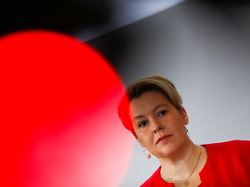Giffey on firecracker attacks
“This kind of destructiveness is a new quality”
01/02/2023 2:53 p.m
After a chaotic New Year’s Eve, Berlin’s Governing Mayor Giffey calls for a nationwide debate on how to deal with firecrackers. Several emergency services were injured in the capital. Consequences must be drawn, says the SPD politician.
ntv: Ms. Mayor, you say you also have a city to govern in the election campaign. In some places here in Berlin on New Year’s Eve, one did not necessarily get the impression that the authorities under your authority really had the situation under control. What do you say about the events of New Year’s Eve?
Franziska Giffey: Of course, what happened here is absolutely unacceptable. We had a very high number of firefighters on duty, three times as many firefighters as we normally do on normal nights. The police were there in large numbers. But this kind of destructive mania, the attacks on rescue workers, the really massive attacks and injuries to people who have been put up with, that is a new quality. And it is quite clear that we have to draw conclusions here. That means we also need a nationwide debate on how to deal with firecrackers and restrictions. We cannot decide that here in Berlin alone. We’ve seen it in other cities too. After a two-year break, there was obviously a backlog that has completely got out of hand.
We need a nationwide debate on how to deal with it next year. And that also means talking about restrictions and consequences and also about consistent criminal prosecution nationwide. No firecracker zones only make sense if you also talk about sales. One state cannot do this alone. Then we need a nationwide solution. I am pleased that Berlin will chair the conference of interior ministers at the beginning of the year. I assume that our interior senator will also speak very clearly with the other interior ministers about the steps to be taken.
You speak of no-gun zones that should perhaps be expanded. Should we think about simply banning firecrackers altogether?
That’s what needs to be talked about. It is important that the police and the emergency services are included in the discussions about what the sensible measures are. I spoke yesterday with our chief of police (Barbara Slowik, editor’s note) spoken to. The picture of the situation is now being analyzed again. We will also address this next week in the Senate session. The chief of police will then also report and present the analyses. And then, together with the fire brigade and police, we have to discuss what the most sensible measures are to counteract this. We need a nationwide discussion about measures and steps, but please with the emergency services in consultation with the police and fire brigade and not from the green table of politics.
The emergency services in particular are being asked to introduce bodycams. Even for firefighters. For the vehicles that were badly damaged, that would be a good way to convict criminals more quickly.
I think everything that serves the safety of the emergency services needs to be discussed. We must do everything to ensure that our 15 emergency services who have been injured recover. But that we also send out the signal: we have your back and we do everything to protect you too. This means that protection options that exist must also be used.
Are the penal provisions that we have enough? Shouldn’t the laws just be implemented more consistently?
I think it’s about speedy prosecution, especially in the case of young offenders who may have committed crimes for the first time. If the procedure takes too long, then that is something where the crime and the punishment are no longer so closely related. And that’s why it’s important that we talk about accelerated criminal proceedings, especially for first-time offenders.
Holger Schmidt-Denker spoke to Franziska Giffey
